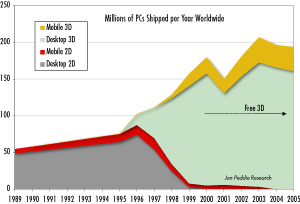How much Graphics Power Does a PC Really Need?
A Few Numbers On PC Gamers
Again, we must ask: is it really worth this level of bother just for games? To help answer this, let's have a look at some numbers and characteristics of the PC gamer community.
According to estimates by Jon Peddie Research , there are between 5 million and 7 million so-called "hard-core" PC gamers and enthusiasts who use their PC primarily for gaming. This group also includes case-modders and overclocking enthusiasts. Over the course of a year, they will regularly spend between $1,500 and $2,000 on hardware, with another $300 invested in games. Of course they have high expectations where image quality and frame rates are concerned.
The group of casual gamers ("the mainstream") is much larger, comprising about 30 million users. While these folks like PC games, they also spend their evenings enjoying other hobbies as well. People belonging to this group also own the newest games, although there are some that only play very infrequently. They also use their computer for work-related tasks. When upgrading their PCs, they try to find parts with the best price-to-performance ratio. They spend between $100 and $1500 on their computers annually, investing an additional $50 to $100 in other components, such as peripherals or other hardware.
If we combine these two groups, that gives us a market consisting of at best 40 million users who actually care about the 3D performance of their graphics cards. Now, 180 million PCs were sold worldwide in 2004 . Leaving aside for now the question of whether these PCs were off-the-shelf units or were assembled by the buyers, that would mean the target audience of users who want a graphics card with good 3D performance makes up about 20% of the entire market. Considering the amounts of money and effort that both ATI and NVIDIA invest into the development of their cards, this is a very small number indeed!
The situation the big graphics card makers find themselves in can best be described as the difference between their goals (driving 3D technology forward) and the most users' actual needs. According to another study conducted by Jon Peddie Research, practically every PC sold today comes with a graphics card offering 3D acceleration, whether or not the user actually needs it.
PC World is 3D - Jon Peddie Research
We would like to take a moment to thank Jon Peddie for providing us with this data.
Get Tom's Hardware's best news and in-depth reviews, straight to your inbox.
Current page: A Few Numbers On PC Gamers
Prev Page The Exploding Cost Of 3D Next Page Intel, The Graphics Market Leader
